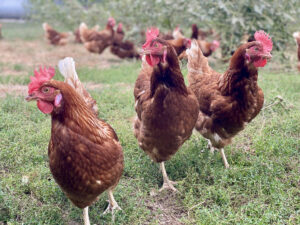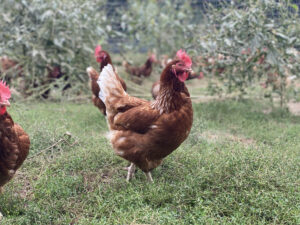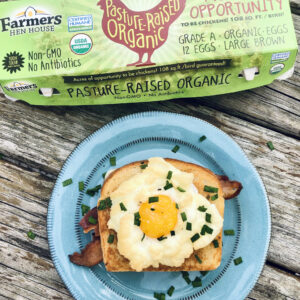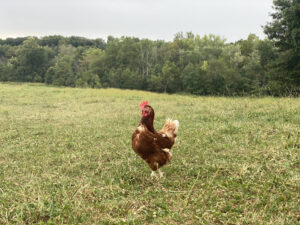Pasture raised eggs have grown significantly in popularity as of recent. The trend has followed a greater awareness of how hens are raised, and what that means in terms of the quality of the eggs they lay. However, knowing the differences between pasture raised eggs and other types of specialty and conventional eggs can be challenging.  Furthermore, sometimes labels like “pasture raised” can seem like a marketing gimmick.
Furthermore, sometimes labels like “pasture raised” can seem like a marketing gimmick.
However, be encouraged that in terms of egg labels, there is oversight so that terms like “pasture-raised” are indeed held to a standard definition. Specifically, we give oversight to the folks at Certified Humane, who make sure we are doing what our carton says we are. In efforts to help you better understand what makes a pasture raised egg “pasture raised,” we thought we provide some helpful facts about pasture-raised eggs.
 Pasture Raised farms provide at least 108 square feet per chicken.
Pasture Raised farms provide at least 108 square feet per chicken.
The outdoor space provided for each hen gives them every opportunity to spread their wings, forage for bugs, dust bathe, and to put it simply, be a chicken!
Pasture raised hens have daily access to the pasture for six hours a day, weather permitting.
Having access to significant time outdoors is important for chickens to live a healthy lifestyle both physically and emotionally.
 Pasture raised hens have access to bushes, trees and/or structures for shade and shelter from predators.
Pasture raised hens have access to bushes, trees and/or structures for shade and shelter from predators.
Being able to take shelter outdoors is critical to a chicken’s sense of well-being and security. Given that chickens tend to be towards the bottom of the food chain, having easy access to trees and shelters gives them the peace of mind needed for them to thoroughly enjoy the outdoors.
 Pasture raised egg yolks tend to be darker due to the varied diet (e.g. bugs, flowers) provided by the ability to forage outdoors.
Pasture raised egg yolks tend to be darker due to the varied diet (e.g. bugs, flowers) provided by the ability to forage outdoors.
The various components and supplements found in bugs, flowers, and other wild plants diversify the chickens’ diet and therefore can help make for richer and darker egg yolks.
Price at the shelf tends to be higher due to the care and increased outdoor space provided the hens.
It’s not necessarily surprising that pasture-raised eggs cost more on the self given the significant amount of outdoor space provided each hen. You can expect to see anywhere from a $1.00 – $2.00 increase over other cage-free and free-range eggs. Is it worth it? We think so, but that’s for you to decide.

 Pasture Raised farms provide at least 108 square feet per chicken.
Pasture Raised farms provide at least 108 square feet per chicken. Pasture raised hens have access to bushes, trees and/or structures for shade and shelter from predators.
Pasture raised hens have access to bushes, trees and/or structures for shade and shelter from predators. Pasture raised egg yolks tend to be darker due to the varied diet (e.g. bugs, flowers) provided by the ability to forage outdoors.
Pasture raised egg yolks tend to be darker due to the varied diet (e.g. bugs, flowers) provided by the ability to forage outdoors. While pasture raised eggs might cost more on the shelf, the quality of eggs your getting far outweighs its cost, and provides you with the peace of mind that you’re eating eggs that not only taste good, but do good for you and the hens!
While pasture raised eggs might cost more on the shelf, the quality of eggs your getting far outweighs its cost, and provides you with the peace of mind that you’re eating eggs that not only taste good, but do good for you and the hens!